
16-24 стр
.pdf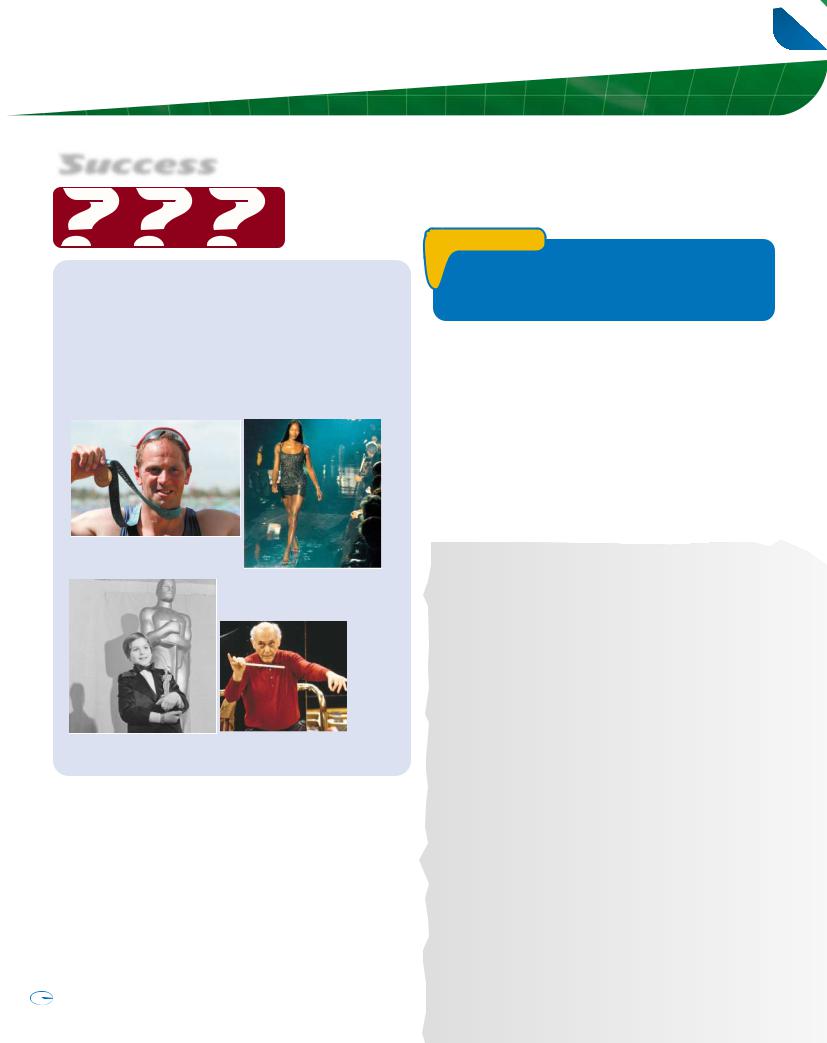
Success
Match the opposites:
•success • rich • win • receive
•poor • give • lose • failure
ADiscuss which two of the following are the most important in achieving success.
•family • appearance • hard work • teacher
•talent or ability • luck
BLook at the successful people below. Which of the things above do you think were most important in their success?
Whose success do you think is the most impressive?
Steve Redgrave has won 5 gold medals
000 a day
|
|
|
Tatum O’Neal won an |
had 31 Grammies |
|
Oscar aged 10 |
he died in 1997 |
|
choose the best
if you were right.
16
information
Look through the text quickly to find specific information. When you see the information you are looking for, read that part of the text more carefully.
Read the article again and tick the statements which are correct. Underline the parts of the article which help you to do this. Correct any incorrect statements.
1Schwarzenegger’s parents wanted him to take up weightlifting.
2Daniel’s headmaster had no confidence in him.
3Schwarzenegger believes the secret of success is difficult to explain.
4You have to have great natural talent to succeed.
5You will work harder if you get something in return for your effort.
1Do you want to be successful? Do you wish you could become a top athlete, a movie star? This article looks at one psychologist’s view of how to achieve your dream.
Arnold Schwarzenegger was a skinny teenager living in
5Austria when, against his parents’ wishes, he started weightlifting. Three times a week he went to the local gym to train, and each evening he worked out for several hours at home. Today the champion bodybuilder-turned-actor has
succeeded in becoming one of the most popular actors
10in the history of the cinema and one of the richest men in show business.
Daniel Green’s headmaster told the 17-year-old schoolboy he ‘would go nowhere’. But Daniel was already
sending high street clothes shops samples of his own fashion
15range. By 22 he had contracts with 30 shops. To achieve his dream – of an enormous store with all the designer brands under one roof – he spent seven months in a tiny flat in London persuading 150 leading designer labels to buy his
products. Today the Brand Centre shop he created 20 is making millions of pounds a year.
What brought two very different people to the top of their professions? Schwarzenegger put his finger on it when, in a recent interview, he was asked to explain his success. ‘Hard work,’ he said. ‘And lots of discipline and
25 positive thinking.’
MATRIX PRE-INTERMEDIATE STUDENT’S BOOK © Oxford University Press www.oup.com/elt

Reading
QuickTip!
Multiple choice questions nearly always follow the order of the information in the text. Look at all the answers carefully before you make your choice.
Answer questions 1–4 by choosing the correct answer, a, b or c. Look at the first one, where an example has been done for you.
1Before Schwarzenegger became a successful actor, he a worked in a gym.
(The text says … ‘he decided to take up weightlifting. ... he went to a local gym to train’). A is incorrect because he didn’t WORK in the gym, he TRAINED in the gym.
b was a champion bodybuilder. c worked in a cinema box-office.
2What did Daniel achieve before he was 22?
a He opened a giant store selling designer brand clothes.
b He had contracts with 150 designer label companies.
c He was supplying shops with clothes he designed himself.
3The author of the text thinks the people who succeed are those
a with the most natural talent and ability. b with the most time.
c who work harder than anyone else most of the time.
4What does ‘This’ refer to in the last sentence? a working hard
b achieving your dream
c giving yourself a reward
Whatever you do, it’s important to have ambition and determination. Those who rise to the topmost heights in any field aren’t just the ones with the greatest natural talent, or luck. They’re the ones who not only put in the
30hours but work effectively by creating enough time for their work. They also learn to improve their weak points instead of worrying about them.
Whatever your work or studies are, always promise
yourself a reward for what you have managed to achieve.
35If you finish your day’s work, then you watch a film. If you do well and your effort is noticed by those around you, be proud of yourself and buy a new pair of trainers. This will inspire you to work even harder!
based on an article in The Reader’s Digest
Vocabulary
4 |
Opposite meanings |
2 |
|
A |
Find adjectives in the article which mean the opposite of |
||
Unit |
|||
|
the adjectives below. They are in the order in which they |
||
|
|
||
|
appear. |
|
|
|
• well built • poorest • tiny • similar • negative |
|
|
|
• strong • ashamed |
|
|
B |
Write sentences using three of the adjectives you found |
|
|
|
in the article. |
|
5 Word formation
AFind the nouns of these adjectives in the article.
•ambitious • disciplined • determined • talented
•lucky • successful • hard-working
BNow use one of the nouns or adjectives in A to complete 1–7.
1 |
Daniel Green is very |
|
|
. He wants to have a shop |
|||||||||||
|
in every city in Europe by the time he’s 30. |
|
|
||||||||||||
2 |
My brother is a wonderful singer. He is very |
|
|
. |
|||||||||||
3 |
You need a lot of |
|
|
|
to win a million pounds on |
||||||||||
|
the lottery. |
|
|
|
|
|
|
|
|
|
|
|
|||
4 |
I’m really tired. Climbing up that hill was |
|
. |
|
|||||||||||
5 |
Arnold Schwarzenegger is a very |
|
|
actor. He has |
|||||||||||
|
made lots of movies and millions of dollars. |
|
|
||||||||||||
6 |
Sarah was so |
|
|
to buy a bicycle that she didn’t go |
|||||||||||
|
out for six months and saved the money. |
|
|
||||||||||||
7 |
My teacher likes to have |
|
|
|
in her classroom. We |
||||||||||
|
have to be quiet. |
|
|
|
|
|
|
|
|
|
|
|
|||
1These pictures show successful people. What would you like to achieve after you leave school?
2Do you agree with the writer’s idea that the only way to succeed is through hard work? What do you think is the key to success?
17
MATRIX PRE-INTERMEDIATE STUDENT’S BOOK © Oxford University Press www.oup.com/elt
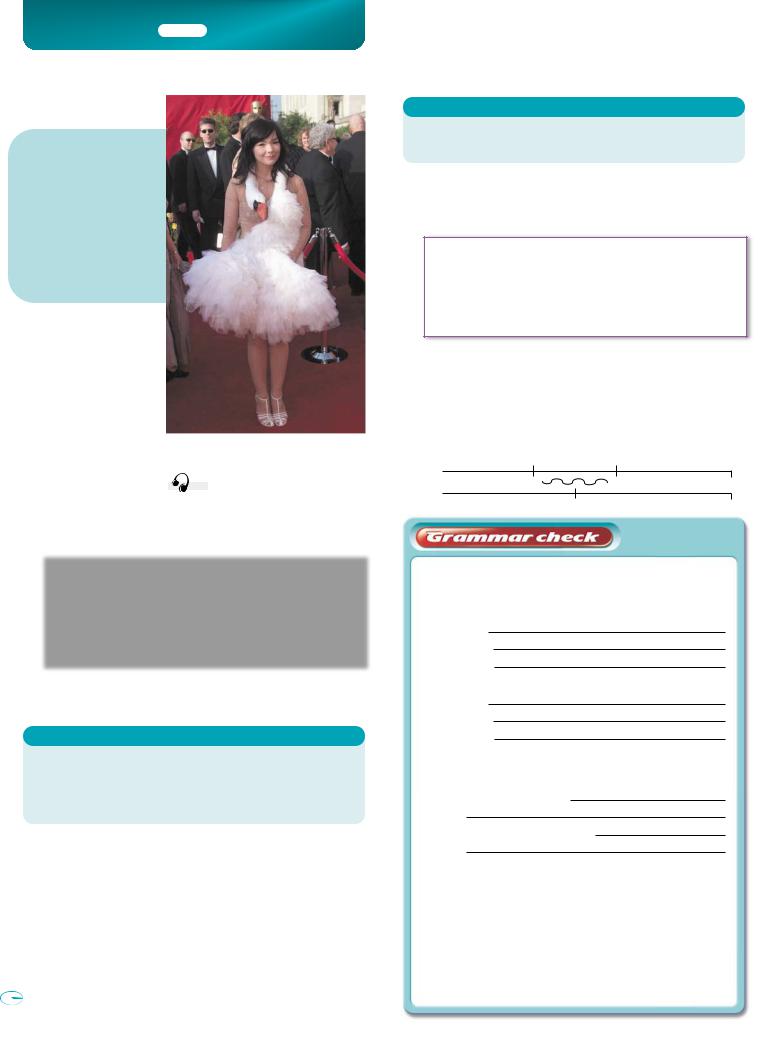
Grammar |
P134 |
|
The past simple and the past continuous
ADo you know who this is?
BWhat bands or singers do you like?
CDid any of them start their careers when they were very young?
2 Irregular verbs
Remember!
Many verbs are irregular. You need to learn the past simple forms: see, saw; drink, drank, etc. Look at page 134.
Björk’s career 1 |
|
|
when she 2 |
|
very young. |
||
|
|
|
|||||
Björk 3 |
|
|
the Best Actress Award at the 53rd |
||||
|
|||||||
Cannes Film Festival for her role in the musical Dancer
in the Dark. She 4 |
|
a factory worker in the film. |
||
|
||||
She also 5 |
|
|
the film’s score herself. |
|
|
||||
1 A radio |
Now |
8+9 |
|
|
Now |
Björk |
|
|
|
|
|
|
She 1 |
|
her first album when she was just 11 years old. |
||||
|
||||||
In the next eight years she 2 |
|
in three bands. |
||||
|
||||||
In 1981, she 3 |
|
on a TV programme, Rock in |
||||
|
||||||
Rekyavik. |
|
|
|
|
|
|
|
|
|
|
|
|
|
Remember!
When a regular verb ends in t or d (e.g. start or record) the -ed ending is pronounced /Id/.
When a regular verb ends in another sound the -ed ending is pronounced /t/ or /d/.
C |
Look at the verbs in A |
How are they pronounced? |
D |
Can you pronounce |
Listen and see if you |
|
were right. |
|
|
• wanted • walked • |
ended • jumped • invented |
|
• believed |
|
18
MATRIX PRE-INTERMEDIATE STUDENT’S BOOK © Oxford University Press www.oup.com/elt

4 The past simple or the past continuous?
Put the verbs in brackets into the past simple or the past continuous.
1 |
When Björk |
|
|
|
|
(perform) with the new band, they |
|||||||||
|
|
|
|
||||||||||||
|
|
|
|
|
(release) two albums, The Eye and Holidays in |
||||||||||
|
|
|
|
|
|||||||||||
|
Europe. |
|
|
|
|
|
|
|
|
|
|||||
2 |
The band then |
|
|
|
(go) on a European tour. |
||||||||||
|
|
|
|||||||||||||
3 |
Björk and her husband |
|
(have) a son and |
||||||||||||
|
|||||||||||||||
|
|
|
|
|
(start) the band the Sugarcubes in 1986. |
||||||||||
|
|
|
|
|
|||||||||||
4 |
Björk |
|
|
|
|
(break) up with her husband, and |
|||||||||
|
|
|
|
||||||||||||
|
|
|
|
|
(move) to London with her son in 1993. |
||||||||||
|
|
|
|
|
|||||||||||
5 |
While she |
|
|
|
|
|
(live) in London, her solo career |
||||||||
|
|
|
|
|
|||||||||||
|
|
|
|
|
(begin). |
|
|
|
|
|
|
||||
|
|
|
|
|
|
|
|
|
|
|
|||||
6 |
She |
|
|
|
|
(choose) a style that was influenced by the |
|||||||||
|
|
|
|
||||||||||||
|
British dance scene. |
|
|
||||||||||||
7 |
She |
|
|
|
|
(take) home the Best Actress Award at the |
|||||||||
|
|
|
|
||||||||||||
|
53rd Cannes Film Festival, for her role in the musical |
||||||||||||||
|
film Dancer in the Dark. |
|
|
||||||||||||
8 |
While she |
|
|
|
|
|
(work) on her new film, she |
||||||||
|
|
|
|
|
|||||||||||
(win) another award.
5The correct tense
Complete this paragraph about a new band by putting the verbs in brackets in the correct tense.
When the band 1 |
|
(get) together, they |
2(not / be) worried about being
compared to other bands. It 3 (not / matter) to them because even then they 4 (make) music which was very different from anyone else’s. They all like different types of music, however. When
(grow) up in France, he
6(like) to listen to rock music like
Police and U2. Paul 7 |
|
|
(grow) up in |
|
Spain. When he 8 |
|
|
(learn) to play |
|
guitar, he used to listen to quite heavy music like Metallica and Led Zeppelin. Since becoming part of the band, they have been able to meet some of their heroes. Anna 9
(meet) Sting at a party but admits she 10 (can / not) think of a single thing to say to him!
Activate
6Information exchange
Work in pairs. One follow the instructions for Student A, the other for Student B.
STUDENT A
Read and complete the text using the past simple or past continuous.
‘Michael (1) (have) breakfast yesterday morning when the post (2) (arrive). He (3) (listen) to the radio at the time so he (4) (not / hear) the postman ring the bell. His mother
(5) (bring) him an official-looking letter a few minutes later. He (6) (open) it, wondering what it (7) (can) be. Imagine his surprise when he (8) (read) it and (9) (find) out that his application to enter the young musician’s talent competition had been accepted!
Student B’s story is called ‘Sarah’s phonecall’.
Find out what happened in the story by asking these questions.
1Where was Sarah when she got the phonecall?
2What was she doing? Why?
3Who phoned her?
4Why was she phoning?
5What did Sarah do then?
text using the past simple or
with her family last July. They weeks. Suddenly, her mobile
(answer) it. It (5) (be) her to tell her that she had
(7) (feel) so excited that she (8) the car at the next motorway
(9) (buy) everyone in her
‘Michael’s letter’.
by asking these questions.
when he got the letter?
problems getting the letter? Why? when he got the letter?
Unit 2
19
MATRIX PRE-INTERMEDIATE STUDENT’S BOOK © Oxford University Press www.oup.com/elt
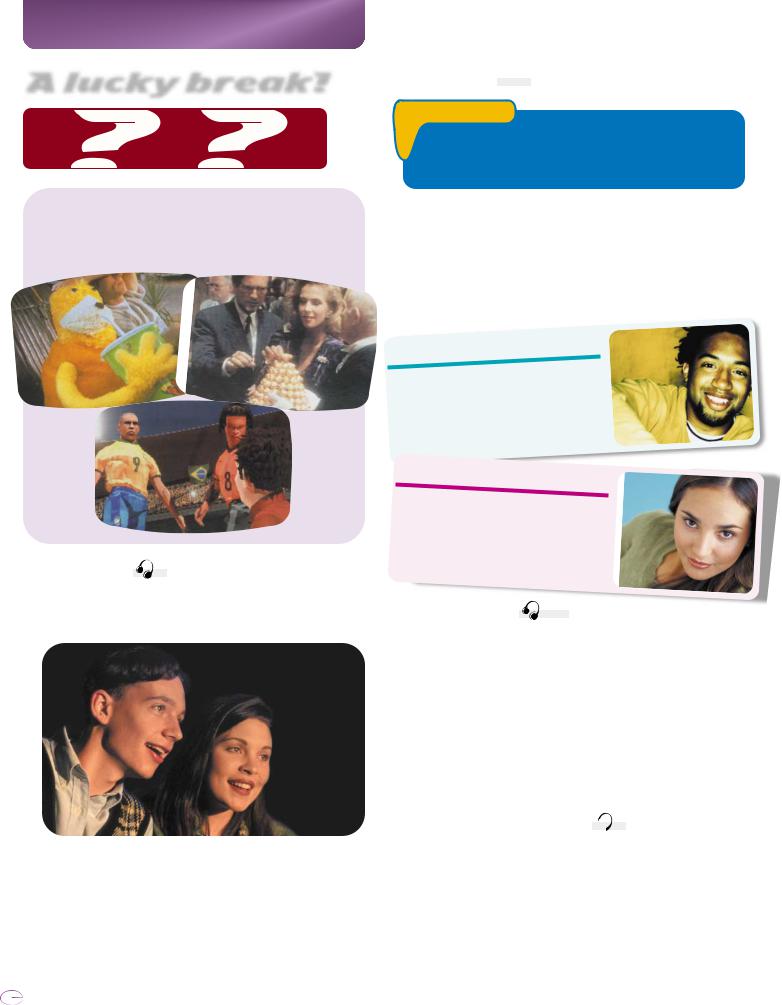
Listening
A lucky break!
Match the verbs to the nouns:
•watch • see • listen to • hear
•a CD • a picture • a programme on TV • a noise
A Do you like adverts? Which is your favourite?
B Look at these adverts. What do you think they are advertising?
|
|
|
|
|
|
|
|
|
|
1 True or false? |
10 |
|
|
|
You will hear |
|
Luke talking about |
||
advertisements |
|
Decide if the statements are |
||
true (T) or false |
|
|
|
|
1 |
Luke likes the |
advert. |
2 |
Sarah thinks |
are good. |
3 |
Luke thinks |
are funny. |
4 |
Sarah can’t understand Luke’s sense of humour. |
|
5 |
Most actors |
in TV adverts in their careers. |
20
2 Note-taking 
 11
11
QuickTip!
You should write no more than two or three words or a number when you write notes, so write only the information you need.
A |
You will hear |
programme about two actors, |
|
Georgina and |
who work in TV advertisements. Look at |
|
these words. |
ones do you think they might use to |
|
describe their |
|
|
• glamorous • |
tiring • embarrassing • exciting |
B |
Look at the |
carefully and complete the notes. |
|
y: |
nn |
|
Da |
|
age now: |
|
how he felt |
|
Georgina:
age now:
how she felt filming
3 Stressed words |
12+13 |
ALook at the sentence which two words
My favourite trainers.
BListen to these stressed most.
1 The adverts are
2 Why aren’t there
3 Do actors really
z Soundbites
Gonna make you a star
. Listen to the recording and decide are stressed.
the television is an advert for
underline the word that is
on TV?
in TV ads?

 14
14
Listen to Gonna make you a star |
by David Essex, then |
|
answer these questions. |
|
|
1 |
What does the singer think |
|
2 |
What is the singer going to |
|
3 |
What does he not care about? |
|
4 |
How would you feel if someone |
to make you a star? |
MATRIX PRE-INTERMEDIATE STUDENT’S BOOK © Oxford University Press www.oup.com/elt

Speaking
1Films
In pairs, ask each other the following questions. 1 How often do you go to the cinema?
2 Do you prefer to watch a film at the cinema or on video? Why?
3 If you watch a film in another language, do you prefer it to have subtitles or a voiceover? Why?
4 Which kinds of films do you prefer? Use these words to help you.
•romantic films • action films • thrillers • historical epics
•comedies • horror films
2Choosing a film
AImagine these three films in English are showing at a cinema near you. Which picture looks the most interesting? What do the numbers in brackets mean?
Chocolat
Juliette Binoche find romance village where inhabitants when open a chocolate Well worth
Gladiator (15)
Oscar-winner Russell Crowe shows real star quality in this monumental epic set in the ancient Roman Empire. The costumes and special effects are magnificent. Definitely worth seeing.
Enemy at the Gates (15)
A wartime story set in Stalingrad. Jude Law is an expert shot, Joseph Fiennes is his close friend, and Rachel Weisz is the woman caught between the two. Interesting for fans of action films.
B Listen to or read the dialogue. Which film do Jim and
Jane decide to go and see? |
|
2 |
|
|
|
1 Expressing preferences |
15 |
Unit |
|
||
Jim Which film should we |
see? |
|
Jane I’d prefer to go and see |
at the Gates. What |
|
about you? |
|
|
Jim I think I’d rather see Gladiator than Enemy at the |
|
|
Gates. I don’t like war |
|
|
Jane I’m sure I’d enjoy Chocolat more than Gladiator. |
|
|
They say it’s very good. |
|
|
Jim OK, let’s go and see |
then. |
|
C You and your partner have decided to go to the cinema. Decide which film you would to see from A. Use the dialogue box to help you
3 Going out
You and your partner have decided to go out before or
after going to the cinema. |
what else you might |
do for the evening. Listen to |
the dialogue and use |
the pictures to help you. |
|
2 Making suggestions |
|
Jane Why don’t we go for |
to eat before the |
film? |
|
Jim Good idea. What |
to that new café? But |
let’s go after the |
we? |
Jane OK, see you later. |
|
4 Giving an account of |
|
|
Find another partner. |
that you went out last |
|
night with your first partner |
it was not a success. |
|
Take it in turns to ask and |
questions to find out: |
|
• |
which film you went |
|
• |
how much it cost to |
the cinema |
•how you felt about the
•what you did after the
• why the night out was |
a failure |
21
MATRIX PRE-INTERMEDIATE STUDENT’S BOOK © Oxford University Press www.oup.com/elt

Culture focus
British cinema
1 Work in pairs. Choose two decades from the text each. Read
Athe texts and make notes about what they tell you.
BClose your books and tell your partner the important points from your two decades. When you have both finished, open your books and read the whole text.
2 Talking about your country
In pairs or small groups, discuss the following questions.
1 Who are the great film stars and directors in your country? 2 How important are TV and video films in your home?
3 What do you think will happen to the cinema in the future?
22
MATRIX PRE-INTERMEDIATE STUDENT’S BOOK © Oxford University Press www.oup.com/elt
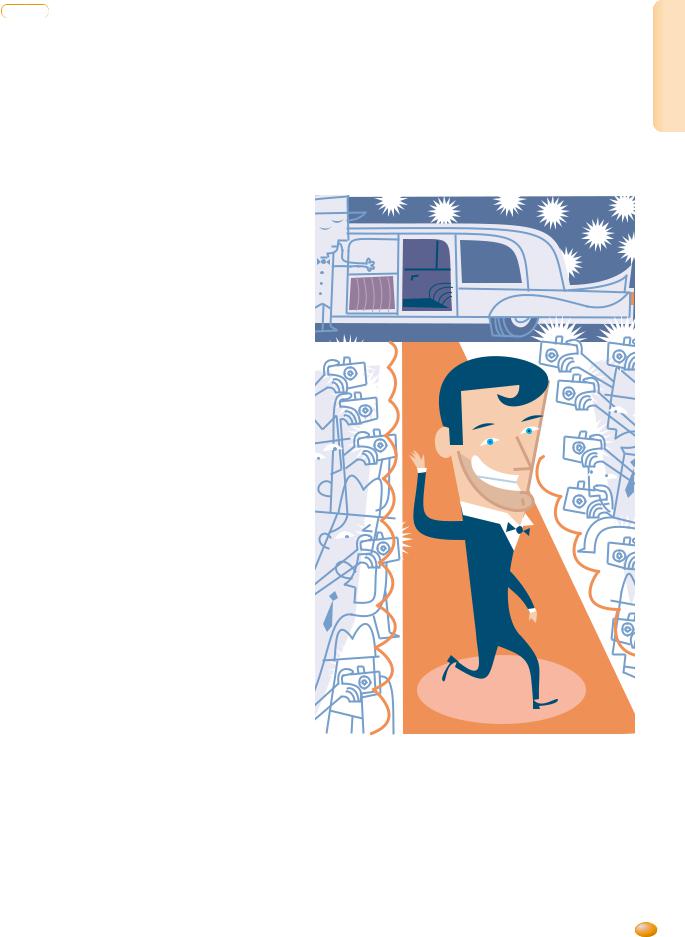
Articles P135
3 |
the or no |
|
|||
A |
The words in |
from the text. Look back at how |
|||
|
they are used |
then match the words in bold |
|||
|
with the explanations of their use in a–c. |
||||
|
1 |
… attracted |
from the United States … (line 8) |
||
|
2 |
… interest |
culture and the English (line 5) |
||
|
3 |
… failures |
back to America (line 16) |
||
|
a |
We usually |
to talk about people who live in a |
||
|
|
country. |
|
||
|
b |
We usually |
for the plural names of countries. |
||
|
c |
We do not |
use an article for the singular names |
||
|
|
of countries |
|
||
B |
Now match |
explanations d and e. |
|||
|
4 |
… the first |
film (line 9) |
||
|
5 |
… spent |
on making films (line 15) |
||
|
d |
We use the |
listener knows which thing we |
||
|
|
mean or |
one of something. |
||
|
e |
We do not |
when we are talking about |
||
|
|
things in |
|
||
C |
Read the |
and fill the gaps with the or |
|||
|
no article. |
|
|||
|
1 |
|
|
|
was the largest single market for |
|
films. |
||||
|
|
|
|||
|
2 |
|
|
|
still an enormous market for films. |
|
|
|
|
||
|
3 |
|
|
|
Steven Spielberg, is very |
|
successful |
||||
|
|
|
|||
|
4 |
|
|
|
came to ‘Hollywood, |
|
England’. |
||||
|
|
|
|||
|
5 |
|
|
|
to be a nation of cinema-goers. |
|
|
|
|
||
|
6 |
|
|
|
of Fire was very popular. |
|
|
|
|
||
D Read the conversation and correct the mistakes. Sometimes needed and sometimes the is missing.
Sue |
I saw |
I have ever seen last night. |
Brad |
Was |
science fiction film? |
Sue |
No. |
the science fiction films. It was a |
|
thriller |
|
Brad |
Oh, |
like the thrillers. |
Sue |
But |
different. It was set in the Brazil |
|
and |
a young girl who gets mixed up |
|
in a |
by mistake. |
Brad |
It |
very interesting to me! |
Sue |
Well, |
believe me why don’t you go to |
|
see |
|
|
|
|
4 a, an or the?
ALook at the sentences in a and b and answer the questions. a I went to see a film on Saturday.
b I went to see the new science fiction film on Saturday.
Do we know anything about the film in a? Do we know anything about the film in b?
BUse the examples to help you complete the rule with the or a.
We use |
|
when a countable noun is mentioned for the |
|||||||
first time. |
|
|
|
|
|
||||
We use |
|
when we know which thing we mean. |
|||||||
|
|
|
|
|
|
|
|
|
|
|
|
|
|
|
|
|
|
|
|
|
|
|
|
|
|
|
|
|
|
|
|
|
|
|
|
|
|
|
|
CAll of the articles in these sentences have been left out. Read the sentences and put a, an or the where necessary. 1 British make fewer films than Americans.
2 Film ‘A1’ is Steven Spielberg film.
3 Many famous Indian films are made in Bombay.
4 What was last film you saw?
5 French make lot of films.
6 Film stars make lot of money.
7 Which is biggest studio in Britain?
8 Movie stars usually live in big houses.
23
Unit 2
MATRIX PRE-INTERMEDIATE STUDENT’S BOOK © Oxford University Press www.oup.com/elt
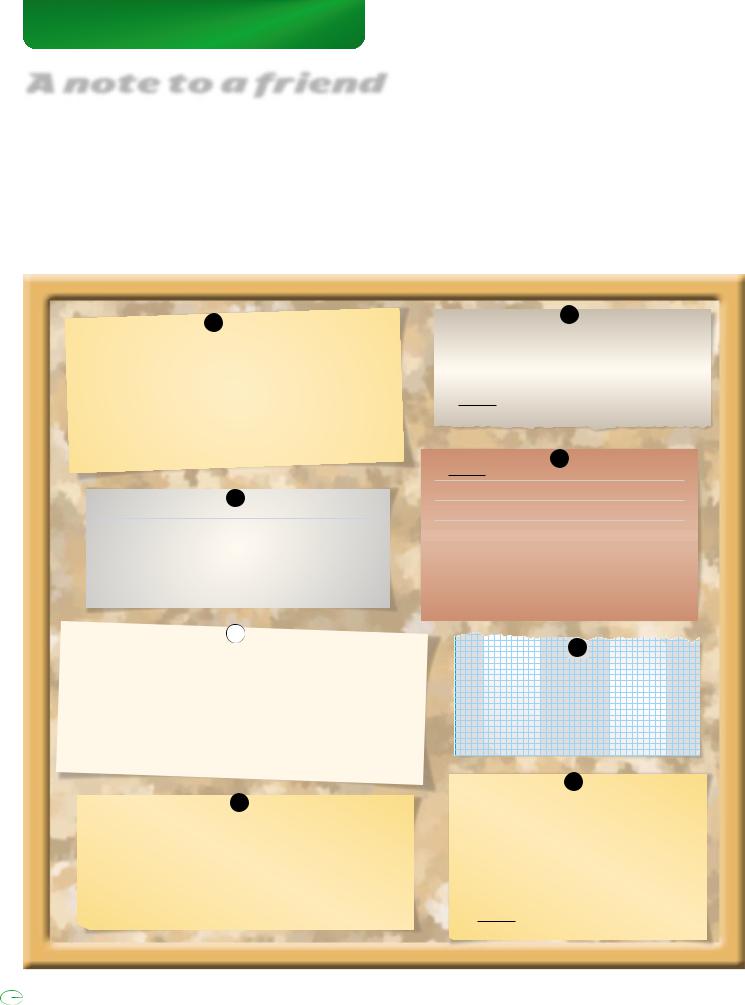
Writing
A note to a friend
Looking at the samples
1
Look
board replies in 1
A
2Types of notes
Look at the notes again. Can you find examples of:
•an invitation
•accepting an invitation
•an apology for not accepting an invitation
•asking for information
•asking someone to do something
•thanking someone for something
E
Jane – |
|
|
|
Jones’ |
Diary |
at the |
||
I’m going to see Bridget |
||||||||
Do you want to come? |
||||||||
cinema tonight |
with |
|
||||||
meeting |
at |
the |
Jericho café |
|||||
|
|
. |
||||||
It starts at 8.15 |
a |
note so |
that |
we know |
||||
at about |
7.15. |
Leave |
||||||
|
you. |
|
|
|
||||
whether |
or not to wait |
|
|
|
|
|||
|
|
|
|
|
||||
Anna |
|
|
|
|
|
|
|
|
I'm glad you liked |
present. Your |
birthday meal was lovely. Do you want to
go through your essay tonight at 7?
1
F
2
B
Dave
Do |
you |
have |
Allie's |
and |
telephone |
|
|
number? |
I'm supposed |
be going |
round |
there |
|||
to |
plan |
an |
essay |
lost |
my |
address |
book. |
Ben |
|
|
|
|
|
|
|
the film. I've
today, so I’m
|
|
|
|
|
going to spend the evening |
the library. |
|
|
|
|
|
|
Hope you enjoy the film! |
|
|
|
See you later. |
|
|
|
Jane |
|
|
3 |
|
C |
|
|
|
||
Andy phoned. |
two spare |
||
tickets for the |
|||
concert in May. |
|||
Do |
|
||
you fancy going? The |
|||
£15 |
each. Please |
tickets are |
|
me know asap as |
|||
he wants an answer |
|||
afternoon. |
|||
Rob |
|
||
|
|
||
D
Tim
Thanks for my lovely present. I had a really great birthday. I hope it didn't take too long to tidy up. Can we arrange for you to help me write my literature essay?
Jenny
Rob |
G |
|
|
I’d love to come to |
concert – it sounds |
great. Could you pay |
the ticket and then I'll |
give you the money |
when I see you? |
Georgie. |
|
H
Ben
I think your address book is on the kitchen table. Anyway, Allie's number is 01865 513754, and her address is 17 The High Street, you have to go round the back of the building, her flat's got a red door.
See you later. 4
24
MATRIX PRE-INTERMEDIATE STUDENT’S BOOK © Oxford University Press www.oup.com/elt

Steps to better writing
3Informal language
When we write notes to friends, we usually use short, informal language which is similar to the language we use when we talk to friends. Look at the notes in 1 again and do 1–6.
1Find four examples of contractions.
Example
I'm going to see Bridget Jones' diary.
2Find a short way of saying thank you.
3There are two sentences containing the verb hope. What word is missing from one of them?
4An informal way of saying goodbye appears in two of the notes. What is it?
5Find these two sentences in the notes. What other words could you use to replace the words in italics?
Sorry, I can't make it to the film. Do you fancy going?
6Find asap in the notes. What do you think it means?
4Prepositions of time
AIn some of the notes, the writers use times and dates – for example at 6.30, on Saturday. Look through the time expressions below. They are used with in, on, at or no preposition. Put the words in the correct column:
•tonight • six o’clock • December • midnight
•Monday • Wednesday 18th • next week • 1995
•12.30 • the 1980s • tomorrow • Christmas Day • yesterday
•the summer
in |
on |
at |
(no preposition) |
1995 |
|
|
|
|
|
|
|
BComplete the sentences with in, on, at or no preposition. 1 Could you pick Jenny up from the station
|
tomorrow? She’s getting in |
|
|
8.14. |
|
|
|
||||||
|
|
|
|
|
|||||||||
2 |
My family always go away on holiday |
|
|
|
the |
||||||||
|
|
|
|||||||||||
|
summer. |
|
|
|
|
|
|
|
|
|
|||
3 |
Just a quick note to thank you for the wonderful party |
||||||||||||
|
|
|
last night. |
|
|
|
|
|
|
|
|
|
|
|
|
|
|
|
|
|
|
|
|
|
|
||
4 |
I’m afraid that we’ll be away on holiday |
|
|
June. |
|||||||||
|
|
||||||||||||
5 |
Do you feel like having dinner |
|
|
|
Tuesday? |
||||||||
|
|
|
|||||||||||
6 |
It’s my birthday |
|
the 15th. |
|
|
|
|
|
|
||||
|
|
|
|
|
|
|
|||||||
Writing notes
5 Making an arrangement |
2 |
|
You have received this note. You decide you want to go to |
||
Unit |
||
see the film. Reply to Bob's note using the information |
||
|
||
on the cinema notice board. Tell him you want to go, and |
|
|
arrange a time to meet outside the cinema. |
|
Do you still want to go to the cinema tonight? I thought we could go and see that new James Bond film. Can you find out which cinema it's showing at and what time it's on?
Hope to see you later. Bob
George Street
Cinema
JAMES BOND in
LIVE WITH A SPY 1.00 6.45
6Apologising
When you get home from checking the cinema time, you find this message from your friend Anna. Write a reply, apologising and saying why you can't go.
Do you fancy coming round to my house to watch a film tonight? We could buy some pizza. I haven't seen you for ages.
Anna
25
MATRIX PRE-INTERMEDIATE STUDENT’S BOOK © Oxford University Press www.oup.com/elt
